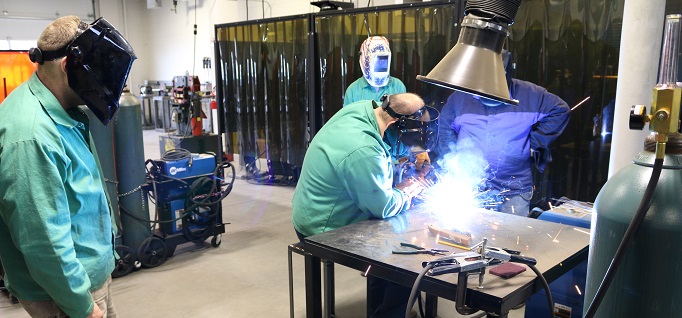Four-year itch
By Dennis Pierce
September 28, 2017
A growing number of community colleges are conferring baccalaureates. Here’s why one college chose to do it.
When Ohio in late June became the latest state to let community colleges award four-year degrees, Clark State Community College President Jo Alice Blondin was ecstatic. Local employers had been telling Blondin’s institution for years that they needed workers with applied bachelor’s degrees in manufacturing technology management. As state lawmakers were considering whether to give community colleges the authority to confer four-year degrees, Blondin brought employers with her to testify before the legislature.
Clark State is located in Springfield, which has a strong manufacturing base. Navistar, which makes commercial trucks, buses and diesel engines, operates a facility in Springfield with some 2,000 employees, and Honda also has a plant nearby. As manufacturing has become increasingly intricate and high-tech, employers need workers who thoroughly understand the people, tools, materials, machines and processes involved, and who have management and supervisory skills as well—and two years of education just isn’t enough.
Clark State had created stackable certificate programs that lead to an associate degree in manufacturing. An applied baccalaureate degree program was “a natural next step” for the college, Blondin says.
“We felt we could stack that next two years of education onto multiple certifications and an associate degree,” she notes. With the state’s approval, Blondin’s institution is now developing a manufacturing technology management curriculum in collaboration with employers—and the college hopes to have students enrolled next fall.
“There is a lot of interest in offering this degree in our region,” she says.
A growing trend
Ohio’s decision to let community colleges award four-year degrees is part of a growing national trend.
At our press time, more than 90 community colleges across 19 states offered active four-year degree programs, says Beth Hagan, executive director of the Community College Baccalaureate Association.
If you count New York’s Fashion Institute of Technology, which technically is a community college but offers degrees as high as doctorates, then at least one community college has had the authority to confer four-year degrees since the mid-70s. But it wasn’t until the 1990s, when campus leaders began to recognize a growing need for applied baccalaureates in their communities, that the practice really took off.
Some two decades later, the idea that community colleges should be able to confer four-year degrees is still controversial. But many of the objections that people have are rooted in misunderstandings about what this practice means, Hagan says.
“These aren’t liberal arts degrees; they are applied baccalaureate degree programs that meet a key workforce need,” she explains.
One compelling reason for a community college to offer a four-year degree program is because there is nowhere else for students to earn that credential within the area. Another is that local universities can’t produce enough graduates to meet employers’ demands by themselves, as might be the case with programs such as nursing or IT. With their focus on local workforce development, their ability to adapt quickly to changing workplace needs, and their close relationship with employers, community colleges are a natural fit to fill the void in applied bachelor’s degrees, Blondin says.
“Employers are interested in flexibility of program design and having input into the curriculum, and they want to work with true collaborators,” she says. “Community colleges aren’t just waking up to this concept of work-force development; we’ve been doing this for a long time. And 85 percent of our graduates stay in our four-county region. With our robust internship programs, the way we work with our employers, and the place-bound nature of our students, we can almost guarantee a workforce for these businesses.”
This is an excerpt from an article that will appear in the upcoming October/November issue of Community College Journal.



